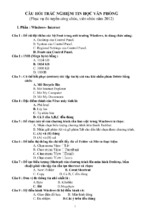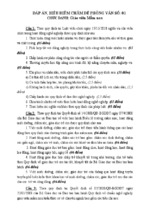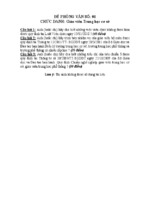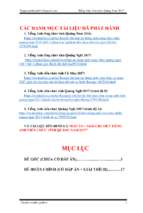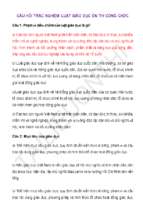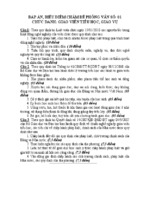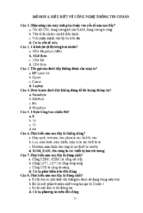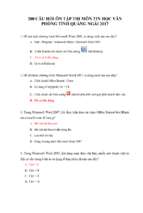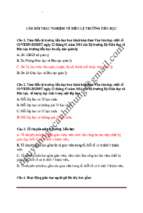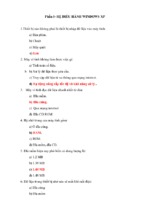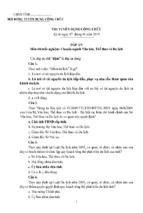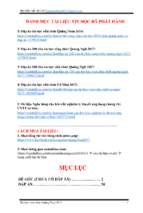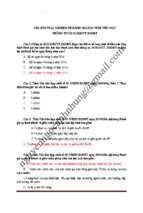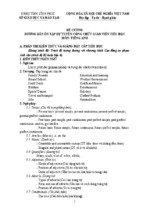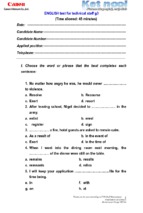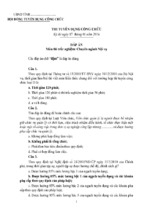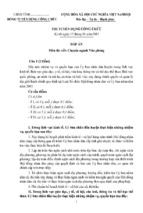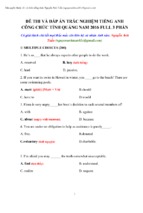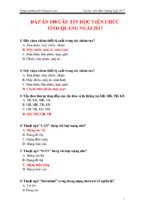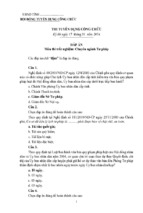BÀI ÔN TẬP TRÌNH ĐỘ B - SỐ 7
PAPER 1: READING COMPREHENSION
Section A : Choose the word or phrase which best completes each sentence. Circle your choice.
1. I’d like to …………… that book when you’ve read it.
A. borrow
B. hire
C. lend
D. loan
2. You forgot to put the milk in the bridge and it has ……………
A. gone back
B. gone down
C. gone off
D. gone out
3. The ……………were delivered to the warehouse by lorry.
A. data
B. goods
C. material
D. stuff
4. The basement in some houses where things are stored is called a(n) ……………
A. attic
B. cave
C. cellar
D. grave
5. The diagram that shows the members of a family and their relation is called a family... …
A. tree
B. branch
C. line
D. river
6. Exams are never enjoyable, ……………?
A. are they
B. are there
C. aren’t they
D. aren’t there
7. I’ve tried on this coat and it doesn’t ……………me.
A. match
B. suit
C. fit
D. wear
8. Fruit and vegetables in a supermarket aren’t so fresh as at a ……………
A. shop
B. black market C. store
D. greengrocer’s
9. It’s unwise to buy new shoes and sandals without first ……………them on.
A. putting
B. trying
C. wearing
D. keeping
10. The magician asked for two volunteers from the ……………
A. watchers
B. spectators
C. audience
D. listeners
11. A TV show, film or play that makes you laugh is called a ……………
A. comedy
B. fun
C. joke
D. humour
12. It’s not going to rain all day. It’s just a ……………and we’ll be able to go out soon.
A. drop
B. shower
C. drought
D. drizzle
13. In the early morning may be thick …………… and motorists dive slowly.
A. fog
B. rain
C. shower
D. mist
14. Before you get in the car, put your luggage in the……………
A. seats
B. gear
C. back
D. boot
15. We drove round the down centre for half an hour looking for a parking ……………
A. space
B. area
C. house
D. stop
1
Section B : Read the passage and answer the questions that follow. Circle your choice.
David Saucez’s bank robbing was as bad as his bingo. Desperate to pay of his gambling
debts, he held up his local bank, and made off with around 2,000 pounds before turning up for
work as a member of Belgian gendarmerie.
It was the earliest his colleagues could have possible expected. For Saucez not only use his
service pistol in the hold-up, but also made his get-away in his own easily recognized family car.
The car’s number was taken by the manager of the Sub Belge bank in the Brussels suburb
of Schaerbeek. He witnessed the hold-up, but was unnoticed by Saucez.
The unhappy gendarme told colleagues who arrested him that he had run up a debt of
60,000 Belgian francs (around 800 pounds), playing bingo. He was also paying off a home loan,
and his wife – who works in another bank – did not know of his gambling.
Saucez, described as a “model gendarme” with six years’ service, said he considered
robbing the same bank the week before. His nerve falled at the last moment, and he ended up
asking for advice on a loan.
On Monday this week be returned to the same bank, and the same temptation. This time is
was too much. He told arresting officers “I had no intention of committing a hold-up. I left the
barracks to go to the bank and request a delay in repaying my loans. It was on the way there that I
decided to take action.”
He was well equipped for the job, if not the getaway. Producing his service pistol, he
demanded and got the money and then made off in his distinctive red Vauxhall.
The gendarmerie, having answered the manager’s alarm call too late to catch the robber
red handed, at least ha had the information to catch him red-vehicled.
They traced the car number to Saucez, alerted his unit in Brussels, which said he had been
on duty but was now absent. A few minutes later be turned up completely with the hold-up
weapon the getaway car, and the remainer of the foots in his pocket.
16. David Saucez works …
A. as a policeman.
B. as a security guard.
C. in the bank he robbed.
D. in another bank.
17. David Saucer robber the bank because he ….
A. played games.
B. tried to give up gambling.
C. was unaware that he was so heavily in debt.
D. was worried about his debt.
18. The previous week, David Saucez had planned to rob the bank but he …..
A. asked them to land him some money.
B. asked them what he should do about borrowing money.
C. paid some money into his account there.
D. didn’t dare to go inside.
19. The police knew about the robbery because ….
A. David Saucez admitted his guilt.
B. David Saucez had parked his car outside the bank.
C. David Saucez was unlucky.
D. the bank manager called them.
20. David Saucez arrived late for his duty because he …..
A. stopped to pay some of the money he owed.
B. was afraid to report for duty.
C. was going to rob the bank.
D. was trying to escape.
2
Section C: Fill each of the numbered blanks in the following passage by using only one word in
each space
They drove down the M4 from Reading to Heathrow in Pete’s new sports (21) ………….
Marilyn always went to the airport with him, although it was not very (22) …………. For her to
take time off work once a month.
Pete usually tried to act cheerful, at least until (23) …………. took off, but this time he
was too upset and angry. He (24) …………. said a word to his girl-friend the whole journey. He
had had an argument with his father the night (25) …………., and he could not get it out of his
mind.
They sat in Terminal 1 Car Park, still not speaking, watching the autumn leaves (26)
………….from the trees. Marylin’s face, pale, and tense, was almost hidden behind her long dark
hair. It was (27) ………….to go. “Bye, love. See you in two weeks.” – “Bye, Pete. Be careful.”
He kissed her quickly, got out of the car, (28) ………….his new suitcase from the boot and
walked over to the terminal building. Marylin (29) ………….him wave and disappear, but she
did not live at once. She sat there for (30) ………….an hour, before driving slowly back to
Reading.
PAPER 2: USE OF ENGLISH AND WRITING
Section A: Make all changes and additions necessary to produce, from the following sets of
words and phrases, sentences:
Example: I / wonder / why you / not / reply / last letter
Answer: I was wondering why you had not replied to my last letter
Dear Mr. Dixon,
31. Please / be advised / that / I / carefully considered / letter / dated January 22
………………………………………………………………………………………………
32. that letter / you / outline / plan / for automating / our plant
………………………………………………………………………………………………
33. We / inform you / our plant / move / 26th street
………………………………………………………………………………………………
34. I / give / your plan / my assistant
………………………………………………………………………………………………
35. He / determine / whether or not / practical application
………………………………………………………………………………………………
36. He / consider / financial viewpoint
………………………………………………………………………………………………
37. He / be / touch / you / phone
………………………………………………………………………………………………
38. And / tell / you / his determination / second of April
………………………………………………………………………………………………
39. If you / wish / consult us / earlier / not hesitate / contact
………………………………………………………………………………………………
40. Assistant / glad / answer / question / connection / this matter
………………………………………………………………………………………………
Sincerely
William Hard castle
3
Section B: Choose one of the following topics and write a composition of between 150 and 180
words. Remember to plan your composition before you starts and proofread it when you have
finished.
1. Suppose you are on holiday and are staying at a hotel by the seaside. Write a letter to
your friend, telling him about the hotel.
2. Write a letter to your friend telling him the place of interests you have just visited
recently.
WRITE IN HERE, PLEASE
......................................................................................................................................................
......................................................................................................................................................
......................................................................................................................................................
......................................................................................................................................................
......................................................................................................................................................
......................................................................................................................................................
......................................................................................................................................................
......................................................................................................................................................
......................................................................................................................................................
......................................................................................................................................................
......................................................................................................................................................
......................................................................................................................................................
......................................................................................................................................................
......................................................................................................................................................
......................................................................................................................................................
......................................................................................................................................................
......................................................................................................................................................
......................................................................................................................................................
......................................................................................................................................................
......................................................................................................................................................
......................................................................................................................................................
......................................................................................................................................................
......................................................................................................................................................
......................................................................................................................................................
4
PAPER 3: LISTENING COMPREHENSION
Part 1:
There will be one minute for you to read the instructions and questions. Note that the numbers
in brackets are those read in the tape. The recording will be played once only. Listen to the
tape and tick (v) the words you hear.
Look at the example below. Listen to the tape. You will hear the example once only.
Decide which word you hear, “soap” or “soup”.
Will you get me some (soap/soup) at the supermarket?
The word was “soup”, so “soup” is ticked.
1. That Dutch friend of mine you met yesterday is very good(chess/ jazz) player.
2. The tube from Liverpool St. to Holborn costs (30p/ 40p).
3. Can I have twenty (No.6/ Embassy), please.
4. Today’s a (holiday/ horrid day), isn’t it?
5. Well, I wonder what (jobs / choice) they have in store for us this time.
6. Only 30% of those sampled (can / can’t) tell the difference between margarine and butter.
7. I can’t really say if I like jazz or not: (sometimes / some kinds) I do.
8. She’s been quite (tearful / cheerful) the last couple of weeks.
9. Graf now seems unlikely to (regain / retain).
10. I think it’s (Dave / Steve) on the phone.
Part 2:
There will be one minute for you to read the instructions and questions.
Now listen to the passage “The Cave People in China” and decide whether the following
statements are true or false. Follow the example
Example
Hanoi is the capital of Vietnam
Hanoi was built in 1911
T
v
F
v
T
F
1. The writer has put inverted commas around the word “building”
to indicate that the actual building of the cave has not yet begun
__
__
2. The word “It” is “It is not just practical…” refers to living in the cave
__
__
3. If the walls of the cave were not covered with
newspaper, they would not last for a long time
__
__
4. The phrase “green architects” refers to architect who
design environmentally-friendly building
__
__
5. The people live in the cave “yao dong” because there are
not enough stone and wood for building in their area
__
__
5
6. A cave home is too small to house a family
__
__
7. Living in a cave is practical but not economical
__
__
8. Cave people decorate their house with paper flowers
__
__
9. Many Western architects also like the concept of cave home
__
__
10. Living in cave is also a way of solving housing problems
__
__
Part 3:
There will be one minute for you to read the instructions and questions.
Gap-Fill: Listen to the following four conversations. Fill in the gaps with the information you
hear. Follow the example.
Example
doing the shopping
Women are interested in…………………………………………
ONE
1. The woman doesn’t finish work until …………..
2. The woman agree to see………….
TWO
3. The man has found a plat of ………….square feet
4. He pays 5.000 ………….
THREE
5. John has got a new ………….
6. The personal stereo used to be ………….dollars
7. John gets ………….dollars in the sale
FOUR
8. Sarah left school at ………….
9. Sarah wants the job but it requires ………….
10. Sarah …………. the job
This is the end of the first.
6
BÀI ĐỌC NGHE CHO GIÁO VIÊN
Part 1:
1. That Dutch friend of mine you met yesterday is a very good chess player.
2. The tube from Liverpool St. to Holborn costs 40p.
3. Can I have twenty No.6, please.
4. Today’s a horrid day, isn’t it?
5. Well, I wonder what joys they have in store for us this time .
6. Only 30% of those sampled can tell the difference between margarine and butter .
7. I can’t really say if I like jazz or not: some kinds I do.
8. She’s been quite tearful the last couple of weeks.
9. Graf now seems unlikely to regain her title.
10. I think it’s Steve on the phone.
__________________________
Part 2:
The Cave People in China.
In China’s inhospitable Northeast, almost 40 million people live caves. In Bai Ping, one of
the villages in the area, everyone lives in one. Even the school is in cave.
The cave, or yao dong, are ideal homes in an area with such a barren environment, where
there are not enough stones and wood for building. Loess, the first soil brought by the wind from
the Gobi Desert, is the only abundant material. Over the years, the soil turns into loess stone,
which is soft and fragile, and is easy to work with. It only takes four or five people a few days to
build a yao dong.
Cave homes are four five metres wide and up to nine metres deep, big enough to house a
family. Before the building starts, it is important to choose the right location for the cave. The
builders make sure that the cave faces south so it will get as much sun as possible. The caves are
then dug either sideways into the face of the valley, or vertical, like wells.
The men start building the home by removing a huge plece of loess, cleaning a space for
what will be the yard, then starting on the cave itself. Once the tunnel earthen walls are built
inside to make the structure stronger. A stone archway is also installed to prevent the house from
collapsing. Openings are then made for a door and windows. A yao dong built in this way will
last at least 100 years, as long as it is regularly maintained.
In some parts of the Northeast, nearly 90% of the population live in caves. It is not just
practical but economical too. Each cave costs about 400 yuan (approximately HK$ 550), half the
price of a conversation brick house. In an area where famers count themselves lucky to earn 150
yuan a month, cost-cutting is important.
7
Inside the caves are cool. They provide a welcome escape from the summer heat, which
can reach 40 degrees Celsius. The walls and ceilings are often covered with newspapers because
it slows down the rate of erosion of the loess. Many of the caves are decorated with colorful
flowers animal shapes make from papers.
The concept of these cave homes may even become popular in the West. Many “green
architects” see them as having useful applications in modern housing. They are cheap, easy to
maintain, and could easily be adapted for solar power. Without realizing it, the villages of
China’s Northeast may have provided the answer to housing problems in the developed world.
__________________________
Part 3:
Man
Would you like to see a movie tonight?
Woman Yes, I’d love to. But don’t finish work until half nine. Can we see anything then?
Man
Yes, I think so. There’s this one. It has a late show tonight. And it looks good too.
Woman All right. Let’s see that one.
__________________________
Woman Did you find the flat you wanted?
Man
Yes, I did. And I got a good deal, I think. It’s almost 500 square feet I pay just over
5,000 a month for it
__________________________
Woman That’s a nice personal stereo, John. Did you get it recently?
Man
Yes, it was quite a bargain. It was over one thousand dollars before. But I got
300 dollars off in the sale.
__________________________
Woman Here’s the job you might be interested in, Sarah.
Sarah
Yes, but is says Form 6 or above. I left school at Form 5, remember?
Woman How about this one?
Sarah
Yes, but my tying isn’t very good.
Woman Well, why don’t you apply for this then?
Sarah
I think I will.
__________________________
8
Đáp án Gợi ý Bài Ôn tập Trình độ B - Số 7:
Paper 1: READING COMPREHENSION
Section A: 15 marks
1.A
9.B
2.D
3.B
10.B
11.A
Section B: 5 marks
16.A
17.D
Section C: 10 marks
21. car
22. easy
25. before
26. falling
29. saw
30. nearly
4.C
12.D
5.A
13.A
18.A
19.D
23. plane
27. time
24. hardly
28. took
6.A
14.D
7.C
15.A
8.D
20.C
Paper 2: WRITING
Section A: 15 marks
Dear Mr. Dixon,
31. Please be advised that I have carefully considered your letter of January 22.
32. In that letter you outlined that a plan of automating our plant.
33. We should like to inform you that our plant has been moved to the 26th street.
34. I have given your plan to our assistant.
35. He will determine whether or not it has practical application.
36. He must consider it from the financial view.
37. He will be in touch with you by phone.
38. And tell you his determination by about second of April.
39. If you wish to consult us earlier, please don’t hesitate to contact us.
40. My assistant will be glad to answer all your questions in connection with this mater.
Sincerely
William Hard castle.
Section B: 15 marks
Paper 3: LISTENING COMPREHENSION
Part 1: 10 marks
1. That Dutch friend of mine you met yesterday is a very good chess player.
2. The tube from Liverpool St. to Holborn costs 40p.
3. Can I have twenty No.6, please .
4. Today’s a horrid day, isn’t it?
5. Well, I wonder what joys they have in store for us this time.
6. Only 30% of those sampled can tell the difference between margarine and butter.
7. I can’t really say if I like jazz or not: some kinds I do.
8. She’s been quite tearful the last couple of weeks.
9. Graf now seems unlikely to regain her title.
10. I think it’s Steve on the phone.
Part 2: 10 marks
1.F
6.F
Part 3: 10 marks
1. half past nine
4. a month
7. 300 (dollars)
10. will apply
2.T
7.F
3.T
8.T
2. the late show
5. personal stereo
8. Form 5
4.T
9.T
5.T
10.T
3. 500 (square metres)
6. 1,000 (dollars)
9. Form 6 and above
Interview: 10 MARKS
TOTAL MARKS FOR THE TEST: 100
9
PASS MARK: 50
10
- Xem thêm -

